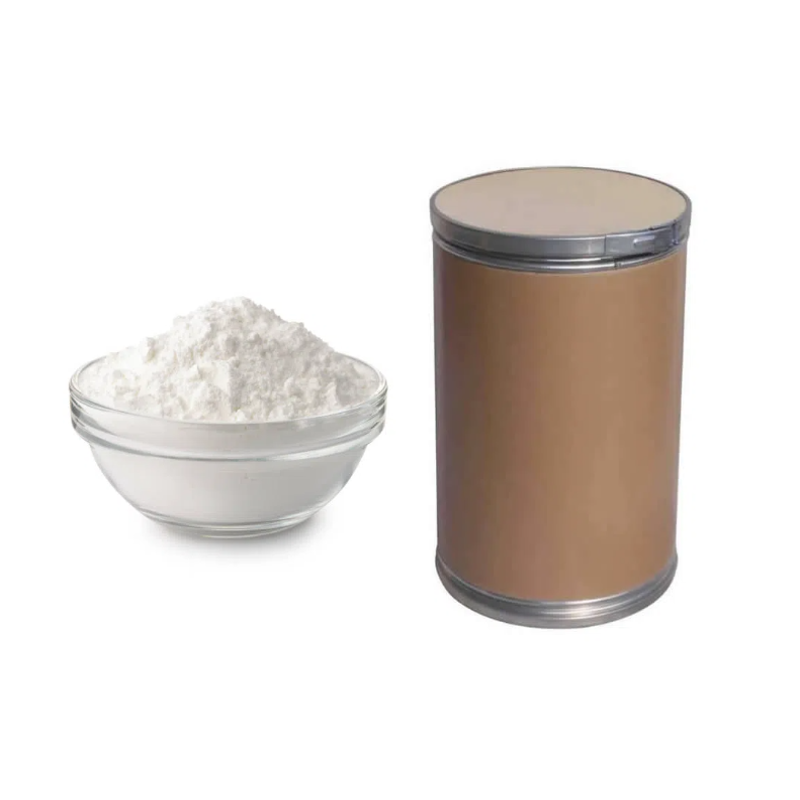-
Categories
-
Pharmaceutical Intermediates
-
Active Pharmaceutical Ingredients
-
Food Additives
- Industrial Coatings
- Agrochemicals
- Dyes and Pigments
- Surfactant
- Flavors and Fragrances
- Chemical Reagents
- Catalyst and Auxiliary
- Natural Products
- Inorganic Chemistry
-
Organic Chemistry
-
Biochemical Engineering
- Analytical Chemistry
-
Cosmetic Ingredient
- Water Treatment Chemical
-
Pharmaceutical Intermediates
Promotion
ECHEMI Mall
Wholesale
Weekly Price
Exhibition
News
-
Trade Service
Metabolic abnormalities caused by overexpression of glutaminase (one of the key enzymes in glutamine metabolism) (GLS) are one of the main signs of renal cancer (RCC).
Telaglenastat (Tela) is a pioneering researcher developed , Selective oral GLS inhibitors can prevent the effect of glutamine and block key downstream signaling pathways
.
Preclinical studies have shown that Telaglenastat and Cabozantinib (a VEGFR2/MET/AXL inhibitor) can produce synergistic anti-tumor effects
.
In the phase I study, Telaglenastat+cabotinib showed better safety and efficacy when used in the second-line treatment of metastatic RCC (mRCC)
.
The CANTATA study explored the efficacy and safety of Telaglenastat+Cabotinib versus placebo+Cabotinib in patients with treated metastatic clear cell renal cell carcinoma (NCT03428217)
.
At this year's ASCO conference, the study announced preliminary research data
.
Methods: Eligible mRCC patients have received 1-2 line system therapy, including ≥1 anti-vascular therapy or nivolumab+ipilimumab, KPS ≥70%, and have measurable lesions assessed according to RECIST 1.
1 standard.
He has not been treated with cabozantinib or other MET inhibitors in the past
.
The enrolled patients were randomly assigned to receive Cabotinib (60 mg PO QD) + Telaglenastat (800 mg PO BID) or Cabotinib + placebo at a 1:1 ratio until disease progression or unacceptable toxicity occurs
.
Stratification factors include whether they have received PD-1/PD-L1 inhibitors and IMDC risk classification
.
The primary endpoint was the blinded independent radiology committee (BIRC) assessment of progression-free survival (PFS, assessed according to the RECIST 1.
1 standard)
.
The data deadline is August 31, 2020
.
Results: 444 patients were randomized.
Telaglenastat+cabotinib and placebo+cabotinib had 221 and 223 patients, respectively.
The baseline characteristics of the two groups were balanced and comparable
.
At a median follow-up of 11.
7 months, 276 patients had previously received immune checkpoint inhibitor therapy, of which 128 patients had previously received nivolumab + ipilimumab
.
The median PFS of the Telaglenastat+cabotinib group and the placebo+cabotinib group were 9.
2 months and 9.
3 months, respectively (HR = 0.
94; 95% CI: 0.
74, 1.
21; P = 0.
65).
The response rate (ORR) was 31% and 28%, respectively
.
At the time of data analysis, the overall survival (OS) results were not yet mature
.
In the specific subgroups previously receiving immunotherapy, the median PFS of the Telaglenastat+cabotinib group and the placebo+cabotinib group were 11.
1 months and 9.
2 months, respectively (HR=0.
77; 95% CI: 0.
56, 1.
06)
.
In the placebo+cabotinib group, the median PFS of patients who received immunotherapy was 9.
2 months, the median PFS of patients who did not receive immunotherapy was 9.
5 months, and the ORR was 32% and 20%, respectively.
Including nivolumab + ipilimumab, ORR is 37%
.
The incidence of adverse events in the Telaglenastat+cabotinib group was similar to that in the placebo+cabotinib group.
The incidence of grade 3-4 adverse events was 71% and 79%, including hypertension (17% vs 18%) and diarrhea ( 15% vs 13%)
.
Cabozantinib was discontinued in 10% and 15% of patients in the two groups due to adverse events
.
Conclusion: The addition of Telaglenastat did not further improve the efficacy of mRCC
.
The Telaglenastat+cabotinib combination regimen was well tolerated, and the adverse events were consistent with the known conditions of each single agent
.
This study provides valuable efficacy data for mRCC patients receiving cabozantinib in the second or third line
.
Clinical trial information: NCT03428217
.
Reference: CANTATA: Primary analysis of a global, randomized, placebo (Pbo)-controlled, double-blind trial of telaglenastat (CB-839) + cabozantinib versus Pbo + cabozantinib in advanced/metastatic renal cell carcinoma (mRCC) patients (pts ) who progressed on immune checkpoint inhibitor (ICI) or anti-angiogenic therapies.
.
abstract 4501.
Oral Abstract Session
Telaglenastat (Tela) is a pioneering researcher developed , Selective oral GLS inhibitors can prevent the effect of glutamine and block key downstream signaling pathways
.
Preclinical studies have shown that Telaglenastat and Cabozantinib (a VEGFR2/MET/AXL inhibitor) can produce synergistic anti-tumor effects
.
In the phase I study, Telaglenastat+cabotinib showed better safety and efficacy when used in the second-line treatment of metastatic RCC (mRCC)
.
The CANTATA study explored the efficacy and safety of Telaglenastat+Cabotinib versus placebo+Cabotinib in patients with treated metastatic clear cell renal cell carcinoma (NCT03428217)
.
At this year's ASCO conference, the study announced preliminary research data
.
Methods: Eligible mRCC patients have received 1-2 line system therapy, including ≥1 anti-vascular therapy or nivolumab+ipilimumab, KPS ≥70%, and have measurable lesions assessed according to RECIST 1.
1 standard.
He has not been treated with cabozantinib or other MET inhibitors in the past
.
The enrolled patients were randomly assigned to receive Cabotinib (60 mg PO QD) + Telaglenastat (800 mg PO BID) or Cabotinib + placebo at a 1:1 ratio until disease progression or unacceptable toxicity occurs
.
Stratification factors include whether they have received PD-1/PD-L1 inhibitors and IMDC risk classification
.
The primary endpoint was the blinded independent radiology committee (BIRC) assessment of progression-free survival (PFS, assessed according to the RECIST 1.
1 standard)
.
The data deadline is August 31, 2020
.
Results: 444 patients were randomized.
Telaglenastat+cabotinib and placebo+cabotinib had 221 and 223 patients, respectively.
The baseline characteristics of the two groups were balanced and comparable
.
At a median follow-up of 11.
7 months, 276 patients had previously received immune checkpoint inhibitor therapy, of which 128 patients had previously received nivolumab + ipilimumab
.
The median PFS of the Telaglenastat+cabotinib group and the placebo+cabotinib group were 9.
2 months and 9.
3 months, respectively (HR = 0.
94; 95% CI: 0.
74, 1.
21; P = 0.
65).
The response rate (ORR) was 31% and 28%, respectively
.
At the time of data analysis, the overall survival (OS) results were not yet mature
.
In the specific subgroups previously receiving immunotherapy, the median PFS of the Telaglenastat+cabotinib group and the placebo+cabotinib group were 11.
1 months and 9.
2 months, respectively (HR=0.
77; 95% CI: 0.
56, 1.
06)
.
In the placebo+cabotinib group, the median PFS of patients who received immunotherapy was 9.
2 months, the median PFS of patients who did not receive immunotherapy was 9.
5 months, and the ORR was 32% and 20%, respectively.
Including nivolumab + ipilimumab, ORR is 37%
.
The incidence of adverse events in the Telaglenastat+cabotinib group was similar to that in the placebo+cabotinib group.
The incidence of grade 3-4 adverse events was 71% and 79%, including hypertension (17% vs 18%) and diarrhea ( 15% vs 13%)
.
Cabozantinib was discontinued in 10% and 15% of patients in the two groups due to adverse events
.
Conclusion: The addition of Telaglenastat did not further improve the efficacy of mRCC
.
The Telaglenastat+cabotinib combination regimen was well tolerated, and the adverse events were consistent with the known conditions of each single agent
.
This study provides valuable efficacy data for mRCC patients receiving cabozantinib in the second or third line
.
Clinical trial information: NCT03428217
.
Reference: CANTATA: Primary analysis of a global, randomized, placebo (Pbo)-controlled, double-blind trial of telaglenastat (CB-839) + cabozantinib versus Pbo + cabozantinib in advanced/metastatic renal cell carcinoma (mRCC) patients (pts ) who progressed on immune checkpoint inhibitor (ICI) or anti-angiogenic therapies.
.
abstract 4501.
Oral Abstract Session







